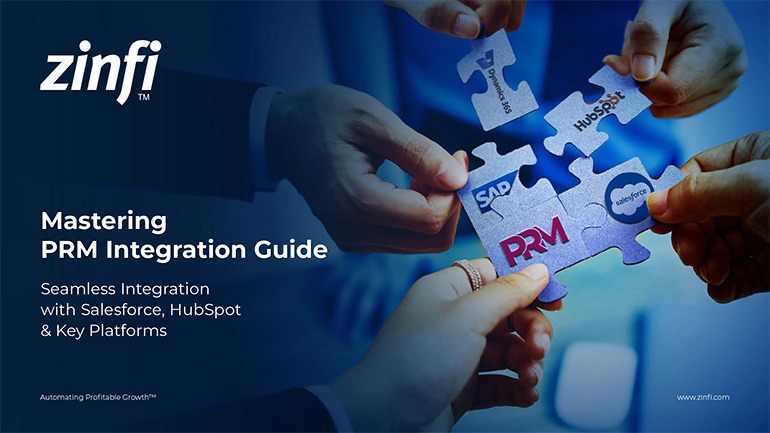Glossary - Channel Partner Platform
What is a Channel Partner Platform?
A channel partner platform is a software solution that enables organizations to manage and optimize their relationships with third-party partners, such as resellers, distributors, and affiliates, who help market and sell the company’s products or services. This platform centralizes and automates onboarding, training, lead distribution, deal registration, performance tracking, and communication. With a channel partner platform, businesses can efficiently collaborate with their partners, ensuring they are well-equipped with the resources needed to drive sales and meet business objectives.
A channel partner platform is critical in streamlining complex workflows in partner ecosystem management and partner management automation across multiple partners. It allows organizations to standardize onboarding, certification, and marketing resource distribution processes while maintaining real-time visibility into partner activities. By leveraging automation, businesses can enhance partner engagement, reduce administrative overhead, and drive greater efficiency in managing their partner ecosystem.
Key Takeaways:
- Centralized Partner Onboarding and Training: A channel partner platform enables organizations to automate and streamline the onboarding process for new partners. By providing a central hub for resources such as training modules, certifications, and product information, the platform ensures partners can quickly become proficient in selling and supporting the company’s offerings. This not only reduces the time it takes for partners to start generating revenue but also ensures consistency in knowledge across the partner network. ZINFI’s platform includes extensive onboarding tools that facilitate a smooth transition for new partners, ensuring they are well-prepared for success. Learn more about ZINFI’s partner onboarding features.
- Automated Lead Distribution and Deal Registration: Channel partner platforms automate lead distribution and deal registration processes, ensuring opportunities are routed to the right partners quickly and accurately. These features help streamline communication between vendors and partners, improving transparency and efficiency in the sales pipeline. By automating these processes, companies can ensure that high-potential leads are not delayed and that partners can easily register their deals. ZINFI’s platform allows businesses to automate these critical workflows, empowering partners to act on leads faster and more efficiently. For more details, visit ZINFI’s lead management tools.
- Improved Partner Engagement and Collaboration: A channel partner platform offers features that enhance partner engagement by providing access to co-branded marketing materials, collaborative business plans, and joint marketing campaigns. This allows partners to participate actively in promotional activities, ensuring they have the tools to succeed in their markets. Additionally, the platform facilitates ongoing communication between vendors and partners, helping to foster a sense of collaboration. ZINFI’s platform provides comprehensive tools to support partner engagement, enabling deeper collaboration and stronger relationships. Watch this video to learn more about partner engagement.
- Real-Time Performance Monitoring and Analytics: One of the most significant benefits of a channel partner platform is tracking partner performance in real-time. With access to detailed analytics and reporting, businesses can assess their partners’ effectiveness, identify improvement areas, and make data-driven decisions to optimize channel strategies. Performance monitoring allows companies to reward high-performing partners and provide additional support to underperforming ones. ZINFI’s platform includes robust analytics tools that offer insights into partner activity, helping businesses make informed decisions to improve channel performance.
- Scalable Ecosystem Management: As businesses grow, managing an expanding network of partners can become increasingly complex. A channel partner platform is designed to scale alongside a growing partner ecosystem, enabling companies to efficiently manage large volumes of partners, campaigns, and sales opportunities. This scalability ensures that organizations can maintain consistency and support even as their partner base expands. ZINFI’s platform is highly flexible and scalable, allowing businesses to manage their entire partner network seamlessly, regardless of size or geographic location.
Summary of Key Takeaways:
A channel partner platform automates critical tasks like onboarding, lead management, and performance tracking, ensuring businesses can engage partners effectively and optimize their channel strategies for better results.
Key Examples:
- Automotive Manufacturing: Automotive manufacturers depend on dealerships and resellers to market and sell vehicles. A channel partner platform helps automotive companies manage these partner relationships by providing automated lead distribution, sales performance tracking, and certification programs for dealership staff. The platform also offers co-branded marketing campaigns and real-time sales analytics tools, allowing manufacturers to respond quickly to market changes. By streamlining these processes, automotive companies can enhance dealership performance and increase vehicle sales.
- Consumer Electronics: Consumer electronics companies work with global distributors and retailers to bring their products to market. A channel partner platform ensures that these companies can efficiently manage relationships with multiple partners by automating product updates, promotions, and inventory management. The platform also provides real-time insights into sales data and market demand, enabling consumer electronics companies to make informed decisions about pricing and promotions. Through co-marketing features, these companies can collaborate with retailers on promotions, helping increase product visibility and drive sales.
- Energy Production: Companies rely on third-party service providers to install and maintain products like solar panels and wind turbines in the energy sector. A channel partner platform facilitates collaboration between energy producers and their service partners by providing access to training resources, technical documentation, and performance-tracking tools. The platform also helps ensure that service providers meet regulatory standards, improving the quality and efficiency of installations. This results in enhanced customer satisfaction and streamlined operations for energy companies.
- Financial Services: Financial services companies like banks and insurance providers often collaborate with brokers and agents to reach customers. A channel partner platform helps financial institutions manage relationships with these partners by automating commission tracking, deal registration, and compliance monitoring. The platform provides training and certification tools to ensure brokers and agents are well-versed in the latest products and services. By enhancing the efficiency of these processes, financial institutions can strengthen their partner relationships and improve service delivery to customers.
- Food and Beverage: Food and beverage manufacturers work with distributors and retailers to ensure their products are available to consumers. A channel partner platform helps these companies manage partner relationships by automating inventory management, sales performance tracking, and marketing collaboration. Through real-time sales data, food and beverage companies can optimize their supply chain and ensure that products are consistently available in stores. The platform also enables joint marketing efforts, helping brands increase product awareness and drive sales at the retail level.
- Healthcare Services: Healthcare providers and medical device manufacturers rely on distributors, hospitals, and clinics to deliver patient products and services. A channel partner platform streamlines the management of these relationships by automating the distribution of product information, training resources, and compliance tracking. The platform also provides tools for monitoring partner performance, ensuring that healthcare providers meet regulatory requirements and deliver high-quality patient care. By improving collaboration with partners, healthcare organizations can ensure better patient outcomes and more efficient service delivery.
- Information Technology: In the IT industry, companies depend on system integrators, Value-Added Resellers (VARs), and Managed Service Providers (MSPs) to sell and implement technology solutions. A channel partner platform simplifies partner management by automating deal registration, co-branded marketing, and product training. The platform also offers analytics tools that allow IT vendors to track partner performance, monitor sales pipelines, and optimize marketing efforts. IT companies can expand their market reach and drive growth by providing partners with the necessary resources and support.
- Pharmaceutical Development: Pharmaceutical companies work with distributors and healthcare providers to bring their products to market. A channel partner platform helps pharmaceutical organizations manage these relationships by automating product distribution, compliance tracking, and performance monitoring. The platform also ensures that partners have access to the latest research, clinical trial results, and training resources, improving patient care quality. By streamlining these processes, pharmaceutical companies can strengthen their distribution network and ensure better health outcomes.
- Retail Industry: Retail companies often partner with distributors, wholesalers, and online marketplaces to expand their market reach. A channel partner platform helps retailers manage these relationships by automating inventory tracking, pricing updates, and joint marketing campaigns. The platform’s real-time analytics enable retailers to monitor sales trends and adjust their strategies based on demand. By enhancing partner collaboration, retailers can improve product availability, drive sales, and maintain consistency across multiple channels.
- Telecommunications: Telecommunications providers rely on resellers and service providers to deliver bundled services such as internet, cable, and phone packages. A channel partner platform helps these companies manage their partner relationships by automating lead distribution, deal registration, and partner training. The platform’s analytics tools also allow telecom providers to track customer acquisition and sales performance, enabling them to optimize their channel strategies. Telecom companies can expand their market reach and improve customer satisfaction by enhancing collaboration with partners.
Conclusion:
A channel partner platform is essential for businesses that rely on indirect sales and marketing channels. By automating key processes such as onboarding, lead management, deal registration, and performance tracking, these platforms enable organizations to manage their partner networks efficiently and drive better business outcomes.
Across industries such as automotive manufacturing, consumer electronics, healthcare services, and telecommunications, channel partner platforms streamline operations and improve collaboration. They allow businesses to scale their partner ecosystems, ensuring consistent performance and engagement as their networks grow.
For organizations looking to optimize their partner management processes, a channel partner platform is an invaluable tool for long-term success and market expansion.
Associated Keywords:
- Channel Partner Management
- Partner Relationship Platform
- Automated Channel Partner Solutions















